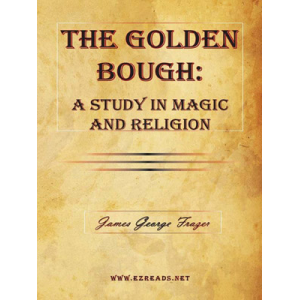
Book: The Golden Bough A Study Of Magic And Religion by Sir James George Frazer
The Golden Bough: A Study in Magic and Religion is a wide-ranging, comparative study of mythology and religion, written by Scottish anthropologist Sir James George Frazer (1854–1941). It first was published in two volumes in 1890; the third edition, published 1906–15, comprised twelve volumes. It was aimed at a broad literate audience raised on tales as told in such publications as Thomas Bulfinch's The Age of Fable, or Stories of Gods and Heroes (1855). It offered a modernist approach to discussing religion, treating it dispassionately as a cultural phenomenon rather than from a theological perspective. The impact of The Golden Bough on contemporary European literature was substantial.The book scandalized the British public upon its first publication, because it included the Christian story of Jesus in its comparative study, thus inviting an agnostic reading of the Lamb of God as a relic of a pagan religion. Frazer removed his analysis of the Crucifixion to a speculative appendix for the third edition, and it was entirely missing from the single-volume abridged edition.
Its influence on the emerging discipline of anthropology was pervasive and undeniable. For example, Bronislaw Malinowski, stricken with tuberculosis shortly after receiving his doctorate in physics and mathematics, read Frazer's work in the original English to distract himself from his illness. "No sooner had I read this great work than I became immersed in it and enslaved by it. I realized then that anthropology, as presented by Sir James Frazer, is a great science, worthy of as much devotion as any of her elder and more exact studies and I became bound to the service of Frazerian anthropology."
Despite whatever controversy the work may have generated, and its critical reception amongst other scholars, The Golden Bough had a tremendous effect on the literature of the period. Robert Graves adapted Frazer's concept of the dying king who is sacrificed for the good of the kingdom to the romantic idea of the poet's necessary suffering for the sake of his Muse-Goddess in his Frazer-esque book on poetry, rituals, and myths, The White Goddess, which was published in 1948. William Butler Yeats makes reference to it in his poem, "Sailing to Byzantium." H. P. Lovecraft mentions the book in his short story "The Call of Cthulhu." T. S. Eliot acknowledged indebtedness to Frazer in his first note to his poem The Waste Land. William Carlos Williams references it as well in Book Two, part two, of his extended poem in five books, Paterson. James Joyce, Ernest Hemingway, D. H. Lawrence, Aleister Crowley, Ezra Pound, Mary Renault, Joseph Campbell, Naomi Mitchison (in her The Corn King and the Spring Queen), and Camille Paglia are but a few authors deeply influenced by The Golden Bough. Its literary impact has given it continued life, even as its direct influence in anthropology has waned.
Free eBooks (Can Be Downloaded):
Lynn Thorndike - A History Of Magic And Experimental ScienceRobert Ellwood - The Encyclopedia Of World Religions
Susan Greenwood - The Nature Of Magic An Anthropology Of Consciousness
Don Karr - The Study Of Solomonic Magic In English
Sir James George Frazer - The Golden Bough A Study Of Magic And Religion








